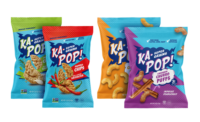Snack Food & Wholesale Bakery was recently able to talk to Samuel Kestenbaum, CEO of ParmCrisps, as well as Mark Singleton, VP of sales and marketing, Southern Recipe Small Batch, about the coronavirus and how it's affecting business.
Liz Parker: How is the coronavirus impacting your business?
Samuel Kestenbaum: As we see it, our biggest challenge today is that we have never been a part of both supply and demand shock at the same time. As a result of the COVID-19 crisis, we’ve seen anywhere from a 30-50 percent increase in our own sales, which seems consistent across grocery brands. Restaurants closing will create a significant decline in foodservice sales while grocery stores and CPG companies will see a sustained demand. This imbalance will, however, create a logistics challenge for the whole industry.
To date, we haven’t experienced any challenges in producing product, and our ability to supply retailers with what they need hasn’t changed. Right now, it’s about getting product to the shelf.
Mark Singleton: Right now, we’re experiencing unprecedented hurricane-like sales levels, not just at our company, but also across selective consumer categories. Historically, these are regional situations, and we see an increase in sales for emergency foods and consumer goods (canned goods and shelf-stable foods), but the current crisis has been more impactful.
LP: How are you pivoting to maintain production, distribution, etc.?
SK: We’re considered an “essential business,” as defined by the government, so we’re going to work for America. As we see it, that’s our duty. Even the responsibilities of our merchandising team have changed, and currently, we’re even helping our retail partners stock their shelves. We’ll continue to do what we need to do through this crisis. At That’s How We Roll, LLC., we’re taking responsibility for feeding America, and we’re all rolling up our sleeves to get it done.
Of course, our supply chain will also need to adapt as we shift assets to align with consumers eating at home more frequently. But, as long as plant employees come to work and trucks are on the road, we will weather the storm.
MS: This challenge is national in scope, so we can’t just shift production from unaffected areas. We're seeing all food categories being impacted to some degree, and it has put a great deal of strain on the national food distribution system. As a result we're doing all we can to support our retail customers in the midst of this. We all have to be in close communication with our customers, ensuring we understand the demand of the times.
As food manufacturers, the only way we can truly help America is by staying focused on keeping people safe, keeping our food safe and keeping that food moving onto store shelves. Food manufacturers also need to understand that this is not a sprint, nor is it a marathon. Consider this a 5k, but we need to be prepared for it. If we’re not, America is going to be so worn out by the time it gets to the height of this event. We have a responsibility to do our part to continue feeding consumers. It's that simple.
Related: Exclusive interview: Q&A with Samuel Kestenbaum, CEO of ParmCrisps







